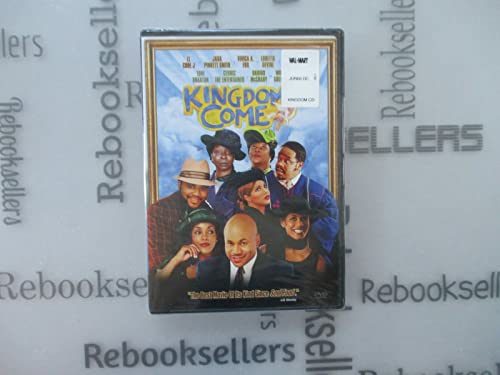*½/**** Image B+ Sound C+ Extras B-
starring LL Cool J, Jada Pinkett Smith, Vivica A. Fox, Loretta Devine
screenplay by David Dean Bottrell & Jessie Jones, based on the play “Dearly Departed” by David Dean Bottrell
directed by Doug McHenry
by Walter Chaw A second-helping of Soul Food but seasoned this time around with a preponderance of syrupy good intentions and a hulking mess of stock burlesque caricatures, Kingdom Come vacillates between ridiculous and irritating: a far cry from the intended “heartwarming” and “funny.” Though it’s always nice to see a film with an all-African-American cast that doesn’t rely on gangsters and gunplay (ignoring a gun that is drawn and forgotten early on), I’m not certain that the opposite of that genre is necessarily forced dramedy camaraderie, complete with a sitcom narrative’s rise and fall, made popular by Waiting to Exhale. Still, for as simple-minded and shamelessly overacted as it is, the film is somewhat redeemed by an overall genial goodwill.
Based on a play called “Dearly Departed” by David Dean Bottrell (adapted for the screen by Bottrell and Jessie Jones) and never escaping the broadness of those theatrical roots (Jada Pinkett Smith is especially bizarre and insufferable in her manic, stagebound gesticulations), Kingdom Come is a generational slapstick involving the fractured Slocumb family, gathered together upon the occasion of the death of patriarch Bud. Raynelle (Whoopi Goldberg) is the long-suffering wife glad for the relief, Bud’s sister Marguerite (Loretta Devine) is the high-decibel mother of wayward Royce (Darius McCrary), and Bud’s two sons Junior (Anthony Anderson) and Ray Bud (LL Cool J) each deal with patent problems in their marriages to, respectively, shrill Charisse (Pinkett) and saintly Lucille (Vivica A. Fox). The ironically dubbed Cedric the Entertainer does a lisping, farting preacher man that fails for even a moment to entertain, while singer Toni Braxton makes her movie debut as the inevitable town vixen.
Although a moment or two approaches the intended pathos and although the picture features some truly inspired set design, costuming, and lighting, there is so much that is convenient, embarrassing, and stereotypical in Kingdom Come it’s impossible for the audience to capture anything like suture. The feat of suspending disbelief required to buy into the travails and interpersonal relationships presented by the film is so extreme that it’s easier just to look on Kingdom Come as a satire of the unfortunate ways that African-Americans are often portrayed in cinema. What I’m trying to say is that Kingdom Come is already on the razor’s edge of being unwatchable and offensive without its pat feel-good resolution, the breed of which is tailor-made for fools and the easily mollified. In retrospect, the same criteria for enjoyment could be applied to the film as a whole.
THE DVDMy first complaint with Fox’s DVD release of Kingdom Come is its animated main menu page. When you first fire up the disc, a seemingly interminable montage underscored by Kirk Franklin’s neo-gospel soundtrack clumsily spoils a couple of the film’s key moments. (In viewing the theatrical trailer also included within the package, I discovered that those moments had already been spoiled, so who am I to complain, right?) That being said, the 2.35:1, anamorphically-enhanced transfer is lush, lovely, and clean, with satisfying shadow detail. The Dolby 5.1 is essentially a mono track with digital clarity–very few surround effects are used, though the caterwauling dialogue diatribes are clear and lamentably easy to understand. Where the format is really served, however, is in its rich reproduction of Franklin’s score.
Director Doug McHenry’s feature-length commentary track is unintentionally revealing in that his constant fawning over his cast (Whoopi, Fox, Pinkett, Cool J, are each described as “brilliant” and “genius” in their turn) demonstrates what happens when a director is infatuated with his performers to the extent that he becomes incapable of modulating their acting. Also revealing is McHenry’s fixation on colour, set, and costuming that simultaneously clarifies the technical achievements of the film to the detriment of the plot/performance aspects. McHenry seems an affable sort, though, and his commentary track is a lot easier on the ears than the movie’s dialogue track. The abovementioned trailer, four TV spots, a video for a Kirk Franklin song, and a five-minute featurette devoted to Franklin’s music round out the disc.
94 minutes; PG; 2.35:1 (16×9-enhanced); English DD 5.1, English Dolby Surround; CC; English, Spanish subtitles; DVD-9; Region One; Fox





![The Fox and the Hound (1981) [25th Anniversary] + The Little Mermaid (1989) [Platinum Edition] - DVDs|The Fox and the Hound/The Fox and the Hound II (2006) [2 Movie Collection] - Blu-ray Disc 6a0168ea36d6b2970c017ee6f2ed72970d](https://i0.wp.com/filmfreakcentral.net/wp-content/uploads/6a0168ea36d6b2970c017ee6f2ed72970d.jpg?resize=150%2C150&ssl=1)
